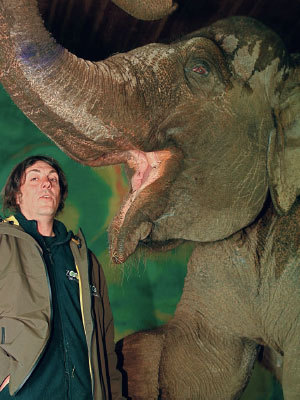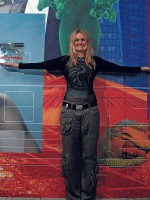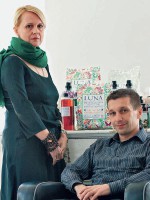Where did the love for the Ganga begin? It started in the early 1980s, when as a student within the Ljubljana Aquarist Society I came to the Ljubljana Zoo to arrange aquariums. Then we boys started doing other work in the garden, etc
Where did the love for the Ganga begin?
It started in the early 1980s, when as a student within the Ljubljana Aquarist Society I came to the Ljubljana Zoo to arrange aquariums. Then we boys started doing other jobs in the garden and that's when I came in contact with Ganga. It was the only animal that completely captivated me and I began to browse the literature and learn about the social structure, morphology, taxonomy of elephants. In 1993, I joined the zoo as an animal keeper, but after five years I left it due to disagreements with the management at the time, especially regarding the care of the elephant.
Has anything changed since 1976, when Ganga came to the zoo as Tito's gift to Ljubljana, until today?
When Ganga came to the zoo, her keepers didn't know much about elephant care. As a result of the unfavorable conditions, the Ganga was then an extremely unpredictable animal that they tried to tame by force. When I first joined the zoo, I started working with Ganga, but my training at the time was based more on my own gut feeling than on my knowledge of elephants. Now, after two interim breaks, I am employed at ZOO Ljubljana for the third time. I have noticed that Ganga has improved tremendously in the last few years, thanks to the caretakers Robert Prašnikar and Silva Grilj. You can see that she is doing well, even though she is alone. The plan to renovate the garden also includes a brand new elephant enclosure and a family of elephants. Elephants are social creatures, and to improve their conditions, a larger number of individuals and a new elephant house are crucial.
What conditions must an elephant keeper meet?
In our country, the status of an elephant keeper has not yet been defined. The title I have is animal keeper. For this, at least a high school education in natural sciences is required, e.g. veterinary technician. For the time being, no special knowledge tests are required. Abroad, there are four levels of elephant keeper. a particularly recognized school for elephant education is The First European Elephant Management School in Hamburg, where Robert and I obtained an elephant keeper certificate in November. Otherwise, it is true that not everyone is suitable to be a caretaker, because you have to show a certain level of authority in relation to animals. That is why we are also considering the introduction of a certain trial period for caretakers.
Elephants are known to be extremely emotional and intelligent creatures. How does this show in Ganga's attitude towards you?
Ganga resented my departures from the garden and my temporary interruptions of work with her. I put a lot of effort into regaining her trust. Her resentment manifested itself mainly in disobedience. Considering that I spoiled her a lot, she soon forgave me. Ganga and I are friends, but her authority today is my colleague Robert, who has invested the most in her in recent years.
Any interesting incident or story related to Ganga?
Ganga does not like noise. she is especially frightened if a truck that is bigger than her drives past the elephant. In such cases, he retreats to the interior, always closes the door behind him and hides until the "danger" has passed. Otherwise, Ganga also shows jealousy. If I'm talking to someone, she starts to put herself between me and the other person, which can be very annoying because of her size (laughs).
What does your working day look like?
Around seven o'clock in the morning, I go to the elephant house, where I do everything that is necessary, from cleaning to the obligatory care of the elephant. I stay with Ganga as long as possible, then my colleagues and I have to take care of the other animals, such as giraffes, camels and the like. The highlights of the day are the presentation and feeding of the elephant, where we show visitors to the garden what we have learned over the years. Riding, lifting the legs, rolling over the trunk... but by no means do we teach Ganga anything that elephants don't do in nature. In the evening, there is also the preparation of the animals for the night and the day ends as if in the blink of an eye.
What did you do during the periods when you were not employed at ZOO Ljubljana?
For five years I was employed at the Vetconsult pharma store, where my knowledge of veterinary medicine was greatly improved. In 2002, my wife and I opened the company Rumeni Taxi, with which we wanted to offer Ljubljana an affordable and, above all, environmentally friendly taxi service, which is recognizable by its hybrid vehicles.
Is there any jealousy in the family because of your "lover"?
My wife and I are both very busy, I at the zoo, and she with the company where we both worked before. We talked about this a lot before I decided to go back to the zoo, so it's not too much of a problem for us now. The son, who is 10 years old, is even happy to visit Ganga sometime.
How do you fill your free time?
As long as I'm not spending it surfing the internet about elephants, and if it can be coordinated with my wife's schedule, we take our motor home to some lake for social gatherings or electric boat races. Radio controlled devices are also one of my passions from my youth. I am a member of the Ljubljana Model Club.
He and his wife are also the founders of the Beetle Club of Slovenia. Do you still have a converted car somewhere, or is there no time left for this hobby?
After 18 years, we still have a converted VW Speedster and our motorhome is also somewhat adapted to our needs. If there were no elephants in my life and if I didn't have Yellow Taxi, I would probably be doing this professionally. My wife and I already wanted to start a tuning company, but at that time there were not good enough conditions for that in Slovenia. We were the go-to team at the time, rebuilding engines and cars. I'm a man who has done many things, but right now I'm completely dedicated to elephants, education and developing protocols for their care in captivity.





